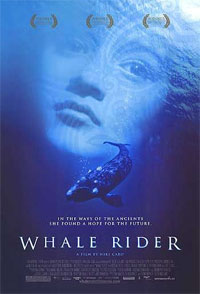Whale Rider
| Whale Rider | |
|---|---|

Theatrical release poster
|
|
| Directed by | Niki Caro |
| Produced by | John Barnett Frank Hübner Tim Sanders |
| Screenplay by | Niki Caro |
| Based on |
The Whale Rider by Witi Ihimaera |
| Starring | See Cast |
| Narrated by | Keisha Castle-Hughes |
| Music by | Lisa Gerrard |
| Cinematography | Leon Narbey |
| Edited by | David Coulson |
|
Production
company |
South Pacific Pictures
ApolloMedia Pandora Films New Zealand Film Production Fund New Zealand Film Commission NZ On Air Filmstiftung Nordrhein-Westfalen |
| Distributed by | Pandora Film (Germany) Newmarket Films (US) |
|
Release date
|
|
|
Running time
|
101 minutes |
| Country | New Zealand Germany |
| Language | English Māori |
| Budget |
NZ$$9.2 million (approx. US $3.5 million) |
| Box office | $41.4 million |
Whale Rider is a 2002 New Zealand-German family drama film directed by Niki Caro, based on the novel of the same name by Witi Ihimaera. The film stars Keisha Castle-Hughes as Kahu Paikea Apirana, a twelve-year-old Maori girl who wants to become the chief of the tribe. Her grandfather Koro believes that this is a role reserved for males only. The film was a coproduction between New Zealand and Germany. It was shot on location in Whangara, the setting of the novel. The world premiere was on 9 September 2002, at the Toronto International Film Festival. The film received critical acclaim upon its release. At age 13, Keisha Castle-Hughes became the youngest nominee for the Academy Award for Best Actress before she was surpassed by Quvenzhané Wallis, at age 9, for Beasts of the Southern Wild less than a decade later. The film earned $41.4 million on a NZ$9,235,000 budget.
The film's plot follows the story of Paikea Apirana ("Pai"). The leader should be the first-born grandson – a direct patrilineal descendant of Paikea, the Whale Rider – he who rode on top of a whale (Tohora) from Hawaiki. However, Pai is female and technically cannot inherit the leadership. While her grandfather, Koro, later forms an affectionate bond with his granddaughter, carrying her to school every day on his bicycle, he also condemns her and blames her for conflicts happening within the tribe.
At one point Paikea decides to live with her father because her grandfather is mistreating her. She finds that she cannot bear to leave the sea as the whale seems to be calling her back. Pai tells her father to turn the car back and returns home. Pai's father refuses to assume traditional leadership; instead he moves to Germany to pursue a career as an artist. Pai herself is interested in the leadership, learning traditional songs and dances, but is given little encouragement by her grandfather. Pai feels that she can become the leader (although there's no precedent for a woman to do so), and is determined to succeed.
...
Wikipedia
